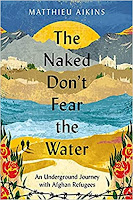Book Review: The Naked Don't Fear the Water: An Underground Journey with Afghan Refugees by Matthieu Aikins
⭐⭐⭐⭐⭐
“When does a migrant become a refugee?”
Canadian journalist Matthieu Aikins spent seven years covering the war in Afghanistan. In the course of his work, he meets and befriends Omar, who acts as his guide and translator. Despite his serving as an interpreter for the Special Forces and having worked with USAID, Omar’s efforts to emigrate to the USA are unsuccessful on account of his being unable to procure all necessary documentation. As the situation in Afghanistan worsens and fearing backlash from the Taliban, Omar plans to emigrate to Europe traveling via the refugee route. He is reluctant to leave without Laila, who he loves but whose family opposes their marriage. Eventually he has to leave without Laila, promising to come back for her.
In August 2016, the author, disguised as an Afghan migrant (using the alias “Habib”), accompanies Omar as he leaves Afghanistan through a smugglers’ route, hoping to be allowed entry into Europe as a refugee. The author, in the process of helping his friend, hopes to gather insight and report on the refugee experience. He leaves his passport and paperwork with friends, fully aware that being discovered with a Western passport by the wrong people could lead to dire consequences. Aikins is also aware of how different his situation is compared to that of Omar whose family is escaping Afghanistan for the second time, the first being in the past when his parents had emigrated to Iran to escape the Soviet invasion. (“There is no future for me here. You have a good job, you have documents, you can travel anywhere you want.” He looked out at his city. “The only thing I have is my luck.”) What follows is a harrowing journey across borders, unsafe passages and dire conditions- all for the hope of a better future for Omar. Though the author and Omar do get separated in the course of their journey, they reunite in Turkey, travel by inflated boat to the Lesbos(after being duped by a smuggler promising to deliver them to different destination), becoming one of the many “boat people” arriving at the Greek island of Lesbos and the Moria refugee camp (“Built for two thousand people, by that point there were around five thousand crammed inside Moria, with hundreds more arriving each week.”) from where they move to a “squat” in Athens from where Omar continues his efforts to secure safe passage onwards.
“The right answer to the question of why you left was: Because I was forced. Because I had no choice. But what does it mean to be free in our world? The refugee is freedom’s negative image; she illustrates the story of progress that we tell ourselves.”
“The Naked Don't Fear the Water: An Underground Journey with Afghan Refugees” by Matthieu Aikins is exceptionally well-written, factual and informative with a fluid narrative that paints a realistic portrait of the peril fraught journey refugees and asylum seekers are compelled to undertake for a life of freedom and liberty that they are denied in their home country. The author discusses in much detail the places and people he encounters through his journey- the smugglers, the migrants and the activists and welfare groups. We also get to know more about Omar’s family and Maryam, Omar’s mother, a high school teacher, who will do everything in her power to keep her family safe.
“Maryam had become a refugee almost forty years ago, and yet Afghanistan was still at war. In the future, her grandchildren would tell her story to their own children here, to Europeans. But if Maryam’s tale inspired because of the long odds that she had survived, then it was also a testament to the many who had vanished. In this way, our stories carry forward fragments of others, just as we pass on our siblings’ genes, though they be childless.”
The author's descriptions of life in the Moria refugee camp and the squatters' residence in Athens are particularly moving. He describes the experiences of migrants in foreign lands and the hurdles they have to go through in seeking asylum and how when faced with rejection of appeals and failure, they are compelled to resort to means and methods that put their lives at risk- a risk they are willing to take to avoid being deported back to the country they are fleeing from. It takes a while to wrap your head around the fact that this is not a work of fiction but an eye-opening first-hand account of events, focusing on the human angle of the refugee crisis that we might read about in the papers or works of fiction, but is the reality for so many people. This is an important book , the kind that stays with you. I commend the author for his courage and initiative in undertaking such a daring endeavor and sharing his experiences through this hard-hitting and thought-provoking memoir.
“We all have things about ourselves we’d like to change, and it’s seductive to imagine it happening in one swift movement. That was the dream behind migration: a fresh start. The journey was a prelude. Life came afterward, and it might be harder, more heartbreaking than the smuggler’s road….But in truth, we can’t leave ourselves behind. We get only one story, which we narrate looking backward.”

Comments
Post a Comment